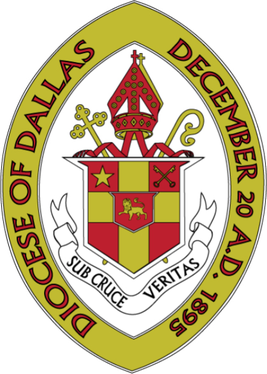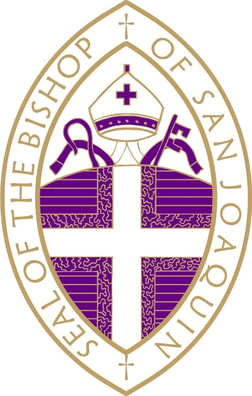
The Episcopal Church in North Texas was a diocese of the Episcopal Church from 1982 to its merger with the Diocese of Texas in 2022. The diocese included a geographic area of 24 counties in the north central part of Texas. As of 2021, it includes 13 churches, including a number of other congregations in the process of reorganization. The jurisdiction was the site of a major schism in 2008. This schism was the result of the diocese's bishop, Jack Iker, leading the majority of clergy and parishes to join the Anglican Church of North America as the Episcopal Diocese of Fort Worth. The Episcopal Church diocese is headquartered in Fort Worth, Texas. It announced on April 22, 2022, that it would seek reunion with the Episcopal Diocese of Texas. The merger was finalized by the 80th General Convention of the Episcopal Church in the United States of America on July 11, 2022.

The Episcopal Diocese of Dallas is a diocese of the Episcopal Church which was formed on December 20, 1895, when the Missionary District of Northern Texas was granted diocesan status at the denomination's General Convention the preceding October. Alexander Charles Garrett, who had served as the first bishop of the Missionary District of Northern Texas, remained as bishop of the new diocese. The diocese began when thirteen parishes were merged.

The Anglican Diocese of South Carolina (ADOSC) is a diocese of the Anglican Church in North America (ACNA). The diocese covers an area of 24 counties in the eastern part of the state of South Carolina. In 2019, it had 18,195 baptized members and 47 parishes. The see city is Charleston, home to the Cathedral of St. Luke and St. Paul.

The Anglican Diocese of Quincy is a member of the Anglican Church in North America and is made up of 32 congregations, principally in Illinois but also in Wisconsin, Minnesota, Texas, Iowa, Nebraska, Missouri, Hawai'i, Colorado, Tennessee, and Florida in the United States. The diocese was a founding member of the Anglican Church in North America in 2009.

The Episcopal Diocese of Pittsburgh is a diocese in the Episcopal Church in the United States of America. Geographically, it encompasses 11 counties in Western Pennsylvania. It was formed in 1865 by dividing the Episcopal Diocese of Pennsylvania. The diocesan cathedral is Trinity Cathedral in downtown Pittsburgh. The Rt. Rev. Ketlen A. Solak was consecrated and seated as its current bishop in autumn 2021.
In the United States, the history of the Episcopal Church has its origins in the Church of England, a church which stresses its continuity with the ancient Western church and claims to maintain apostolic succession. Its close links to the Crown led to its reorganization on an independent basis in the 1780s. In the nineteenth and early twentieth centuries, it was characterized sociologically by a disproportionately large number of high status Americans as well as English immigrants; for example, more than a quarter of all presidents of the United States have been Episcopalians. Although it was not among the leading participants of the abolitionist movement in the early 19th century, by the early 20th century its social engagement had increased to the point that it was an important participant in the Social Gospel movement, though it never provided much support for the Prohibitionist movement. Like other mainline churches in the United States, its membership decreased from the 1960s. This was also a period in which the church took a more open attitude on the role of women and toward homosexuality, while engaging in liturgical revision parallel to that of the Roman Catholic Church in the post Vatican II era.
The Anglican realignment is a movement among some Anglicans to align themselves under new or alternative oversight within or outside the Anglican Communion. This movement is primarily active in parts of the Episcopal Church in the United States and the Anglican Church of Canada. Two of the major events that contributed to the movement were the 2002 decision of the Diocese of New Westminster in Canada to authorise a rite of blessing for same-sex unions, and the nomination of two openly gay priests in 2003 to become bishops. Jeffrey John, an openly gay priest with a long-time partner, was appointed to be the next Bishop of Reading in the Church of England and the General Convention of the Episcopal Church ratified the election of Gene Robinson, an openly gay non-celibate man, as Bishop of New Hampshire. Jeffrey John ultimately declined the appointment due to pressure.
The Dennis Canon is a common name used for Title I.7.4 of the Canons of the Episcopal Church in the United States of America.
The Anglican Diocese of San Joaquin (ADSJ) is a diocese in the Anglican Church in North America (ACNA). It came into being after a majority of congregants in the Episcopal Diocese of San Joaquin separated from the Episcopal Church in 2007. Prior to the separation, the Episcopal Church diocese was one of the most conservative in the church, and one of three that did not ordain women. The Anglican diocese is now headquartered in Fresno. The pre-separation diocese had a membership of approximately 8,500.

The Anglican Church in North America (ACNA) is a Christian denomination in the Anglican tradition in the United States and Canada. It also includes ten congregations in Mexico, two mission churches in Guatemala, and a missionary diocese in Cuba. Headquartered in Ambridge, Pennsylvania, the church reported more than 1,000 congregations and more than 128,000 members in 2023. The first archbishop of the ACNA was Robert Duncan, who was succeeded by Foley Beach in 2014. In June 2024, the College of Bishops elected Steve Wood as the third archbishop of the ACNA. Authority was transferred to him during the closing Eucharist at the ACNA Assembly 2024 conference in Latrobe, Pennsylvania.

The Episcopal Diocese of San Joaquin (EDSJ) is a diocese of the Episcopal Church (TEC), located in central California with its headquarters in Fresno. It can trace its roots back to the earliest days of American settlement in California.
The Anglican Diocese of Pittsburgh is a diocese of the Anglican Church in North America. It has parishes in the several counties of Western Pennsylvania. In addition, the diocese has oversight of several parishes that are not located within its geographical boundaries, including three in Illinois, two in Tennessee, and one in Colorado. The diocese also has a parish in Mexico.

The Diocese of Quincy was a diocese of the Episcopal Church in western Illinois from 1877 to 2013. The cathedral seat was originally in Quincy, Illinois but was moved to St. Paul's Cathedral in Peoria in 1963. In order to avoid confusion with the Roman Catholic Diocese of Peoria, the diocese retained the name of the location of its original "home" city, Quincy, where its cathedral seat was St. John's.

Charles Wallis Ohl Jr. is an American bishop who was the Provisional Bishop of Fort Worth in The Episcopal Church. Jack Iker had been the Bishop of Fort Worth in the Episcopal Church until a super-majority of the diocese voted to dissolve its union with the General Convention at the 2007 and 2008 diocesan conventions. Those members of the diocese who wished to remain in the Episcopal Church met in a special convention on February 7, 2009. Edwin F. Gulick Jr., the Bishop of Kentucky who was planning to retire soon, was appointed as Provisional Bishop. In November 2009, the Annual Convention of that diocese elected Ohl as their new provisional bishop.

Jack Leo Iker was an American Anglican bishop. From 1995 to 2019, he was the third bishop of the Episcopal Diocese of Fort Worth. In this capacity, he was a leading figure in the Anglican realignment, overseeing the departure of the Diocese of Fort Worth from the Episcopal Church in 2008 and co-founding the Anglican Church in North America. He was also a leading figure in American Anglo-Catholicism and an opponent of women's ordination to the priesthood.

The Episcopal Diocese of South Carolina (EDOSC), known as The Episcopal Church in South Carolina from January 2013 until September 2019, is a diocese of the Episcopal Church. The diocese covers an area of 24 counties in the eastern part of the U.S. state of South Carolina. The see city is Charleston, home to Grace Church Cathedral and the diocesan headquarters. The western portion of the state forms the Episcopal Diocese of Upper South Carolina. As a diocese of the Episcopal Church, the Diocese of South Carolina is part of the worldwide Anglican Communion and traces its heritage to the beginnings of Christianity.

St. Vincent's Cathedral is an Anglican church in Bedford, Texas. It is the cathedral of the Episcopal Diocese of Fort Worth. The cathedral played a major part in the Anglican realignment by hosting the inaugural assembly in 2009 where the Anglican Church in North America was constituted.

Ryan Spencer Reed is an American Anglican bishop. Since 2020, he has been the fourth diocesan bishop of the Episcopal Diocese of Fort Worth in the Anglican Church in North America.
William Avery Thompson (1946–2020) was an American Anglican bishop. A key figure in the Anglican realignment in the United States, he was the longtime rector of All Saints Episcopal Church, which left the Episcopal Church for oversight by the Church of Uganda in 2004. He became a leader in the Common Cause Partnership, which in 2009 emerged as the Anglican Church in North America, and in 2009 was elected the first bishop of the ACNA's Diocese of Western Anglicans.

Terrell Lyles Glenn Jr. is an American bishop of the Anglican Church in North America. He is a former Episcopal priest who played an active role in the Anglican realignment in the United States. Consecrated in 2008 to serve as a bishop in the Anglican Mission in the Americas, Glenn is now an assisting bishop overseeing North Carolina congregations in the Diocese of the Carolinas.


















